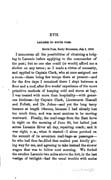
[p. 182]
XVII
LARAMIE TO SOUTH PASS.
SOUTH PASS, Rocky Mountains, July 5, 1859.
Do I, then, discredit the tales of Mormon outrages
and crime—of the murder of the Parrishes, the Mountain Meadow massacre, etc. etc.—wherewith the general ear has recently been shocked? No, I do not. Some of these may have been fabricated by Gentile malice—others are doubtless exaggerated—but there is some basis of truth for the current Gentile conviction that
the Mormons have robbed, maimed, and even killed
persons in this territory, under circumstances which
should subject the perpetrators to condign punishment,
but that Mormon witnesses, grand jurors, petit jurors,
and magistrates determinedly screen the guilty. I
deeply regret the necessity of believing this; but the
facts are incontestable. That a large party of emigrants —not less than eighty—from Arkansas to California,
were foully massacred at Mountain Meadows in
September, 1857, more immediately by Indians, but under the
direct inspiration and direction of the Mormon settlers
in that vicinity—to whom, and not to the savages, the emigrants had surrendered, after a siege, on the strength
of assurances that their lives at least should be spared—
is established by evidence that cannot (I think) be
in-
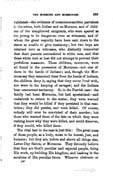
[p. 225]
validated
—the evidence of conscience-smitten partakers
in the crime, both Indian and ex-Mormon, and of
children of the slaughtered emigrants, who were spared as too young to be dangerous even as witnesses, and of
whom the great majority have been sent down to the
states as unable to give testimony; but two boys are retained here as witnesses, who distinctly remember
that their parents surrendered to white men, and that these white men at best did not attempt to prevent their perfidious massacre. These children, moreover, were
all found in the possession of Mormons—not one of
them in the hands of Indians; and, though the
Mormons say they ransomed them from the hands of Indians,
the children deny it, saying that they never lived with,
nor were in the keeping of savages; and the Indians
bear concurrent testimony. So in the Parrish case: the
family had been Mormons, but had apostatized—and
undertook to return to the states; they were warned
that they would be killed if they persisted in that
resolution; they did persist, and were killed. Of course,
nobody will ever be convicted of their murder; but
those who warned them of the fate on which they were
rushing know why they were killed, and could discover,
if they would, who killed them.
The vital fact in the case is just this: The great mass
of these people, as a body, mean to be honest, just, and
humane; but they are, before and above all things else,
Latter-Day Saints, or Mormons. They devoutly believe
that they are God's peculiar and especial people, doing
His work, up-building His kingdom, and basking in the
sunshine of His peculiar favor. Whoever obstructs or
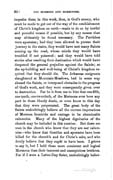
[p. 226]
impedes them in this work, then, is God's enemy, who
must be made to get out of the way of the establishment
of Christ's kingdom on earth—made to do so by lawful
and peaceful means if possible, but by any means that
may ultimately be found necessary. The Parrisheswere apostates; had they been allowed to pursue their journey to the states, they would have met many Saints
coming, up the road, whose minds they would have
troubled if not poisoned; and they would have told
stories after reaching their destination which would have
deepened the general prejudice against the Saints; so
the up-building and well-being of Christ's kingdom
required that they should die. The Arkansas emigrants slaughtered at Mountain-Meadows, had in some way
abused the Saints, or interposed obstacles to the progress
of God's work, and they were consequently given over
to destruction. Far be it from me to hint that one-fifth,
one-tenth, one-twentieth, of the Mormons ever bore any
part in these bloody deeds, or even know to this day
that they were perpetrated. The great body of the
Saints undoubtingly believe all the current imputations
of Mormon homicide and outrage to be abominable
calumnies. Many of the highest dignitaries of the
church may be included in this number. But there are
men in the church who know that they are not
calumnies—who know that Gentiles and apostates have been
killed for the church's and for Christ's sake, and who
firmly believe that they ought to have been. I grieve
to say it, but I hold these more consistent and logical
Mormons than their innocent and unsuspicious brethren.
For if I were a Latter-Day Saint, undoubtingly
believ-
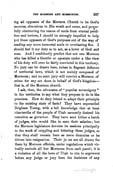
[p. 227]
ing
all opposers of the Mormon Church to be God's
enemies, obnoxious to His wrath and curse, and
powerfully obstructing the rescue of souls from eternal
perdition and torture, I should be strongly impelled to help
put those opposers of God's purposes out of the way of
sending any more immortal souls to everlasting fire. I
should feel it my duty so to act, as a lover of God and
man. And I confidently predict that not one Mormon
who has killed a Gentile or apostate under a like view
of his duty will ever be fairly convicted in this territory.
No jury can be drawn here, unless in flagrant defiance
of territorial laws, which is not mainly composed of
Mormons; and no such jury will convict a Mormon of
crime for any act done in behalf of God's kingdom—
that is, of the Mormon church.
I ask, then, the advocates of "popular sovereignty"
in the territories to say what they propose to do in the
premises. How do they intend to adapt their principle
to the existing state of facts? They have superseded
Brigham Young, with a full knowledge that at least
nine-tenths of the people of Utah earnestly desired his
retention as governor. They have sent hither a batch
of judges, who would like to earn their salaries; but
the Mormon legislature devotes its sessions principally
to the work of crippling and fettering these judges, so
that they shall remain here as mere dummies or be
driven into resignation. Their juries are all drawn for
them by Mormon officials, under regulations which
virtually exclude all but Mormons from each panel; it is
a violation of all the laws of Utah to cite in argument
before any judge or jury here the decisions of any
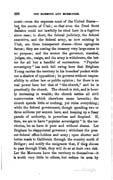
[p. 228]
court—even the supreme court of the United States—
but the courts of Utah; so that even the Dred Scott
decision could not lawfully be cited here in a fugitive
slave case; in short, the federal judiciary, the federal
executive, and the federal army, as now existing in
Utah, are three transparent shams—three egregious
farces; they are costing the treasury very large sums to
no purpose; and the sooner the governor, marshal,
judges, etc., resign, and the army is withdrawn, the
better for all but a handful of contractors. "Popular
sovereignty" has such full swing here that Brigham
Young carries the territory in his breeches' pocket
without a shadow of opposition; he governs without
responsibility to either law or public opinion; for there is no
real power here but that of "the church," and he is
practically the church. The church is rich, and is
hourly increasing in wealth; the church settles all civil
controversies which elsewhere cause lawsuits; the
church spends little or nothing, yet rules everything;
while the federal government, though spending two or
three millions per annum here, and keeping up a fussy
parade of authority, is powerless and despised. If,
then, we are to have "popular sovereignty" in the
territories, let us have it pure and without shams. Let
Brigham be reappointed governor; withdraw the
present federal office-holders and army; open shorter and
better roads to California through the country north of
Bridger; and notify the emigrants that, if they choose
to pass through Utah, they will do so at their own risk. Let the Mormons have the territory to themselves—it is worth very little to others, but reduce its area by
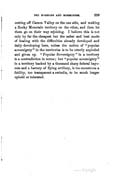
[p. 229]
cutting off Carson Valley on the one side, and making
a Rocky Mountain territory on the other, and then let
them go on their way rejoicing. I believe this is not
only by far the cheapest but the safest and best mode
of dealing with the difficulties already developed and
daily developing here, unless the notion of "popular
sovereignty" in the territories is to be utterly exploded
and given up. "Popular Sovereignty" in a territory
is a contradiction in terms; but "popular sovereignty"
in a territory backed by a thousand sharp federal
bayonets and a battery of flying artillery, is too monstrous a
futility, too transparent a swindle, to be much longer
upheld or tolerated.
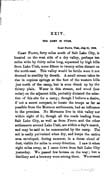
[p. 245]
XXIV. THE ARMY IN UTAH.
Camp Floyd, Utah, July 21, 1869.
The army undoubtingly and universally believes that Mormonism is, at least on the part of the master spirits
of "the church," an organized, secret, treasonable
conspiracy to extend the power, increase the wealth, and
gratify the lecherous appetites of those leaders, who are
using the forms and terms of religion to mask and shield
systematic adultery, perjury, counterfeiting, robbery,
treason, and even murder. It points to the wholesale
massacre at Mountain-meadows, the murder of the
Parrishes, and a hundred more such, as instances of
Mormon assassination for the good of the church, the
chastisement of its enemies, or the aggrandizement of its
leading members—to the impossibility of bringing the
perpetrators of these crimes to justice, to the territorial
laws of Utah which empower Mormon functionaries to select the grand and petit jurors even for the United
States courts, and impose qualifications which in effect
secure the exclusion of all but Mormons from the jury-
box, and to the uniform refusal of those jurors to indict
or convict those who have committed crimes in the
interest of Mormonism,* as proof positive that all at-
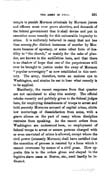
[p. 251]
tempts
to punish Mormon criminals by Mormon jurors
and officers must ever prove abortive, and demands of
the federal government that it shall devise and put in
execution some remedy for this unbearable impunity to
crime. It is uniformly believed in camp that not less than seventy-five distinct instances of murder by Mormons because of apostacy, or some other form of
hostility to "the church," or mainly for the sake of
plunder, are known to the authorities here, and that there
is no shadow of hope that one of the perpetrators will
ever be brought to justice under the sway of Mormon
"popular sovereignty" as now established in this
territory. The army, therefore, turns an anxious eye to
Washington, and strains its ear to hear what remedy is
to be applied.
Manifestly, the recent responses from that quarter are not calculated to allay this anxiety. The official rebuke recently and publicly given to the federal judges here, for employing detachments of troops to arrest and hold securely Mormons accused of capital crime, elicits low mutterings of dissatisfaction from some, with a grave silence on the part of many whom discipline restrains from speaking. As the recent orders from Washington are understood here, no employment of federal troops to arrest or secure persons charged with or even convicted of crime is allowed, except where the civil power (intensely Mormon) shall have certified that the execution of process is resisted by a force which it cannot overcome by means of a civil posse. How opposite this is to the orders given and obeyed in the fugitive slave cases at Boston, etc., need hardly be indicated.
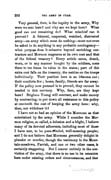
[p. 252]
Very general, then, is the inquiry in the army, Why were we sent here? and why are we kept here? What good can our remaining do? What mischief can it prevent? A fettered, suspected, watched, distrusted army—an army which must do nothing—must not even be asked to do anything in any probable contingency— what purpose does it subserve beyond enriching contractors and Mormon magnates at its own cost and that of the federal treasury? Every article eaten, drank, worn, or in any manner bought by the soldiers, costs three to ten times its value in the states; part of this extra cost falls on the treasury, the residue on the troops individually. Their position here is an irksome one; their comforts few; home, family, friends are far away. If the policy now pursued is to prevail, they cannot be needed in this territory. Why, then, are they kept here? Brigham Young will contract, and make moneyby contracting, to put down all resistance to this policy at one-tenth the cost of keeping the army here: why, then, not withdraw it?
I have not so bad an opinion of the Mormons as that entertained by the army. While I consider the
Mormon religion, so called, a delusion and a blight, I believe
many of its devoted adherents, including most of those
I have met, to be pure-minded, well-meaning people;
and I do not believe that Mormons generally delight in plunder or murder, though the testimony in the
Mountain-meadows, Parrish, and one or two other cases, is certainly staggering. But I concur entirely in the
conviction of the army, that there is no use in its retention
here under existing orders and circumstances, and that

[p. 253]
three or four companies of dragoons would answer every
purpose of this large and costly concentration of troops.
The army would cost less almost anywhere else, and
could not anywhere be less useful.
A suspicion that it is kept here to answer private pecuniary ends is widely entertained. It is known that vast sums have been made out of its transportation by favored contractors. Take a single instance already quite notorious: twenty-two cents per pound is paid for the transportation of all provisions, munitions, etc., from Leavenworth to this point. The great contractors were allowed this for transporting this year's supply of flour. By a little dexterous management at Washington, they were next allowed to furnish the flour here —Utah flour—being paid their twenty-two cents per pound for transportation, in addition to the prime cost on the Missouri. As Utah has a better soil for growing wheat than almost anything else, they had no difficulty in sub-letting this contract at seven cents per pound net, making a clear profit of one hundred and seventy thousand dollars on the contract, without risking a dollar, or lifting a finger. Of course, I expect contractors to bargain for themselves, not for the government, but somebody is well paid for taking care of the public's interest in such matters. Has he done his duty?
Again, pursuant to a recent order from Washington,
the Assistant Quartermaster-General here is now selling
by auction some two thousand mules—about two-thirds
of all the government owns in this territory. These
mules cost one hundred and seventy-five dollars each,
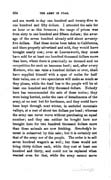
[p. 254]
and are worth to-day one hundred and twenty-five to
one hundred and fifty dollars. I attended the sale for
an hour or so this forenoon; the range of prices was
from sixty to one hundred and fifteen dollars; the
average of the seven hundred already sold about seventy-
five dollars. Had these mules been taken to California,
and there properly advertised and sold, they would have
brought nearly cost; even at Leavenworth, they must
have sold for at least one hundred thousand dollars more
than here, where there is practically no demand and no
competition for such an immense herd; and, after every
Mormon, who can raise a hundred dollars or over, shall
have supplied himself with a span of mules for half
their value, one or two speculators will make as much as
they please, while the dead loss to the people will be at
least one hundred and fifty thousand dollars. Nobody
here has recommended the sale of these mules; they
were being herded, under the care of detachments of the
army, at no cost but for herdsmen, and they could have
been kept through next winter, in secluded mountain
valleys, at a cost of about ten dollars per head; whereas
the army can never move without purchasing an equal
number; and they can neither be bought here nor
brought here for two hundred thousand dollars more
than these animals are now fetching. Somebody's
interest is subserved by this sale; but it is certainly not
that of the army nor of the people. The order is to sell
seven hundred wagon's as well; but these would not
bring thirty dollars each, while they cost at least one
hundred and thirty, and could not be replaced when
wanted even for that, while the army cannot move
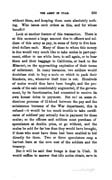
[p. 255]
without them, and keeping them costs absolutely
nothing. Who issues such orders as this, and for whose
benefit?
Look at another feature of this transaction. There is at this moment a large amount due to officers and soldiers of this army as pay, in sums of forty to five hundred dollars each. Many of those to whom this money is due would very much like to take mules in part- payment, either to use while here, to sell again, or to bear them and their baggage to California, or back to the Missouri, on the approaching expiration of their terms of enlistment. In many instances, two soldiers would doubtless club to buy a mule on which to pack their blankets, etc., whenever their time is out. Hundreds of mules would thus have been bought, and the proceeds of the sale considerably augmented, if the government, by its functionaries, had consented to receive its own honest debts in payment. But no! on some ridiculous pretense of ill-blood between the pay and the subsistence bureaux of the War department, this is refused—it would be too much trouble to take certificates of soldiers' pay actually due in payment for these mules; so the officers and soldiers must purchase of speculators at double price, or go without, and the mules be sold for far less than they would have brought, if those who must have them had been enabled to bid directly for them. Two or three speculators reap a harvest here at the sore cost of the soldiers and the treasury.
But it will be said that forage is dear in Utah. It would suffice to answer that idle mules obtain, save in
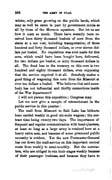
[p. 256]
winter, only grass growing on the public lands, which
may as well be eaten in part by government mules as
all by those of the Mormon squatters. But let us see
how it costs so much. There have recently been
received here thirty thousand bushels of corn from the
states at a net cost, including transportation, of three
hundred and forty thousand dollars, or over eleven
dollars per bushel. No requisition was ever made for this
corn, which could have been bought here, delivered,
for two dollars per bushel, or sixty thousand dollars in
all. The dead loss to the treasury on this corn is two
hundred and eighty thousand dollars, even supposing
that the service required it at all. Somebody makes a
good thing of wagoning this corn from the Missouri at
over ten dollars a bushel. Who believes that said
somebody has not influential and thrifty connections inside
of the War department?
I will not pursue this exposition; Congress may.
Let me now give a sample of retrenchment in the public service in this quarter:
The mail from Missouri to Salt Lake has hitherto been carried weekly in good six-mule wagons; the
contract time being twenty-two days. The importance of
frequent and regular communication with head-quarters,
at least so long as a large army is retained here at a
heavy extra cost, and because of some presumed public
necessity is evident. Yet the new Postmaster-General
has cut down the mail-service on this important central
route from weekly to semi-monthly. But the
contractors, who are obliged to run their stages weekly because
of their passenger business, and because they have to
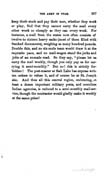
[p. 257]
keep their stock and pay their men, whether they work
or play, find that they cannot carry the mail every
other week so cheaply as they can every week. For
instance, a mail from the states now often consists of
twelve to sixteen heavy sacks (most of them filled with
franked documents), weighing as many hundred pounds.
Double this, and no six-mule team would draw it at the
requisite pace, and no mail-wagon stand the jerks and
jolts of an unmade road. So they say, "please let us
carry the mail weekly, though you only pay us for car-
rying it semi-monthly." But no! this is strictly
forbidden! The post-master at Salt Lake has express
written orders to refuse it, and of course he at St. Joseph
also. And thus all this central region, embracing, at
least a dozen important military posts, and countless
Indian agencies, is reduced to a semi-monthly mail-
service, though the contractor would gladly make it weekly
at the same price!
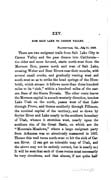
[p. 258]
XXV.
ROM SALT LAKE TO CARSON VALLEY.
Placerville, Cal., July 31, 1859.
There are two emigrant trails from Salt Lake City to Carson Valley and the pass thence into California—
the older and more favored, starts north-west from the
Mormon Zion, passes north and west of Salt Lake, crossing Weber and Bear Rivers near their mouths, with several small creeks, and gradually veering west and
south-west so as to strike the head springs of the
Humboldt, which stream it follows more than three hundred
miles to its "sink," within a hundred miles of the
eastern Base of the Sierra Nevada. The other route leaves
the Mormon capital in a south-westerly direction, touches
Lake Utah on the north, passes west of that Lake
through Provo, and thence southerly through Fillmore, the nominal capital of the territory, and so down by
Soyier River and Lake nearly to the southern boundary of Utah, whence it stretches west, nearly upon the southern rim of the Great Basin, on which are the "Mountain-Meadows," where a large emigrant party from Arkansas was so atrociously massacred in 1857.
Thence this trail turns north-west to hit the sink of
Carson River. (I can get no tolerable map of Utah, and the above may not be entirely correct, but is nearly so.) It will be seen that each of these routes must necessarily
be very circuitous, and that almost, if not quite half
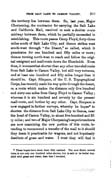
[p. 259]
the territory lies between them.